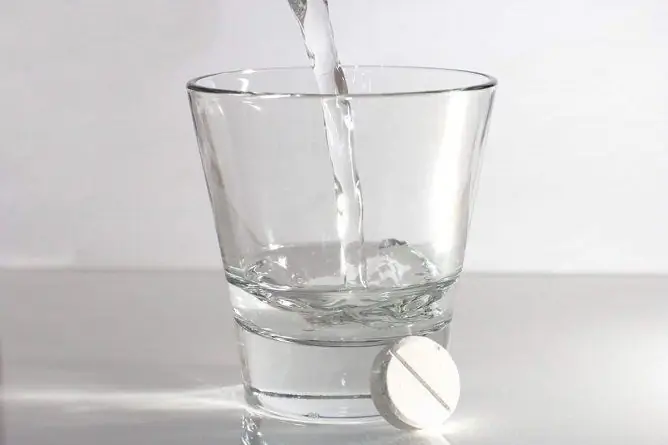- Author Rachel Wainwright wainwright@abchealthonline.com.
- Public 2023-12-15 07:39.
- Last modified 2025-11-02 20:14.
Urethritis in men
The content of the article:
- Causes of urethritis in men and risk factors
- Forms of the disease
- Disease stages
- Symptoms of urethritis in men
- Diagnostics
- Treatment of urethritis in men
- Possible complications and consequences
- Forecast
- Prevention
Urethritis in men is inflammation of the lining of the urethra, or urethra. The male urethra differs from the female one - it is several times longer and has an S-shaped bend, this is the reason for significant differences in the course of urethritis in men and women.
Young men are more likely to suffer from urethritis.

Urethritis in men is an inflammatory infection of the urethra
Causes of urethritis in men and risk factors
The overwhelming majority of cases of inflammation of the urethra are caused by infection, non-infectious urethritis is much less common, and the non-infectious form of urethritis can become infectious.
In most cases, infectious urethritis in men is due to STIs (sexually transmitted infections). In addition to them, opportunistic microorganisms (staphylococci, E. coli, etc.), which are activated when the body's defenses are reduced, can serve as causative agents of infectious urethritis.
The most common cause of urethritis in men is infection with gonococcus (Neisseria gonorrhoeae), in this case they speak of gonococcal urethritis. The causative agents of non-gonococcal infectious urethritis in most cases are chlamydia (Chlamydia trachomatis) and Trichomonas (Trichomonas vaginalis). In addition, viruses (herpes simplex virus, adenoviruses, etc.), fungi (Candida ablicans) and opportunistic microorganisms (E. coli, mycoplasmas, etc.) can be infectious agents. In about 30% of cases, it is not possible to establish the cause of non-gonococcal urethritis.

Gonococcus infection is the most common cause of urethritis in men
Predisposing factors of urethral inflammation are:
- unprotected sex with carriers of the infection;
- non-compliance with the rules of personal hygiene;
- trauma to the urethra (including during medical procedures);
- urolithiasis disease;
- congestion in the pelvic organs;
- metabolic disorders;
- hypothermia of the body;
- hypovitaminosis;
- poor nutrition;
- allergic reactions;
- Irritation of the urethra by chemicals in body care products, spermicides, condoms, etc.
Forms of the disease
Depending on the cause, urethritis in men is divided into infectious and non-infectious, and infectious, in turn, into gonococcal and non-gonococcal.
Non-gonococcal urethritis is divided into types depending on the pathogen:
- bacterial (caused by opportunistic microflora);
- chlamydial;
- trichomonas;
- mycotic (candidal, fungal);
- viral;
- tuberculous;
- ureaplasmic;
- mycoplasma;
- gardnerella;
- mixed.
Non-infectious urethritis in men is of the following types:
- allergic;
- traumatic;
- stagnant (congestive).
According to the duration of the course of the disease, fresh (acute, subacute and torpid) and chronic urethritis are distinguished.
Depending on the localization of the pathological process:
- anterior urethritis - in the anterior part of the urethra, that is, located closer to the outlet on the glans penis;
- posterior - in the posterior part of the urethra, that is, it is localized closer to the bladder.
Disease stages
Fresh (acute) urethritis proceeds in three stages:
- The incubation period is the time from the moment of infection to the onset of the disease, lasting from 1-2 days to 2 weeks.
- The period of severe symptoms.
- The period of convalescence is complete recovery under favorable conditions (treatment) or chronicity of the process, that is, the transition of the disease to a chronic form in an unfavorable scenario.
In the clinical picture of chronic urethritis, three alternating periods are also distinguished:
- Aggravation (symptoms are pronounced).
- Remission (asymptomatic, but the inflammatory process is not resolved, it continues in an implicit form).
- Unstable remission (scant clinical manifestations).
Symptoms of urethritis in men
In about half of cases, urethritis in men has a latent (latent) course, when the symptoms are either absent at all, or are so mild that they do not attract the attention of the patient. The first pronounced signs of the disease can in this case appear after several months (in some cases - years) from the moment of infection.
Symptoms of urethritis in men are cramps, burning and itching when urinating, redness and adhesion of the external opening of the urethra due to secretions, which can be mucous or purulent, as well as swelling of the glans penis. The nature of the discharge depends on the pathogen: gonorrheal urethritis proceeds, as a rule, with a large amount of purulent or purulent-mucous discharge, for candidal urethritis, mucous discharge of a whitish color is characteristic, in other forms of urethritis, the discharge is more scarce, in some cases it may be absent altogether (for example, with inflammation of the urethra of a viral nature). Urination is more frequent, soreness during ejaculation is often noted, traces of blood are sometimes found in the urine and ejaculate. In the case of an acute course of the disease, the general condition also suffers, weakness, rapid fatigue, aching joints and muscles appear, and the body temperature rises.

The main symptom of urethritis in men is pain, burning and itching when urinating.
In the absence of treatment, after 1-2 weeks from the moment of debut, the symptoms of urethritis subside, and the disease becomes chronic. For chronic urethritis in men, a wave-like course is characteristic - periods of remission are replaced by exacerbations. During the period of remission, the manifestations of the disease are absent, with exacerbations, mild pains appear along the urethra, minor discharge, as well as pain during and / or after urination, ejaculation may also be painful.
Diagnostics
Complaints and anamnesis are collected, as well as a physical examination of the patient. In order to clarify the diagnosis, a laboratory examination is prescribed, which includes:
- general blood analysis;
- general urine analysis;
- bacterioscopic examination of a smear of the contents of the urethra, stained according to Gram;
- bacteriological culture of urogenital secretions;
- antibioticogram;
- polymerase chain reaction;
- linked immunosorbent assay;
- method of direct immunofluorescence, etc.

Culture of contents from the urethra helps to determine the cause of urethritis in men
Treatment of urethritis in men
Treatment of urethritis in men is carried out on an outpatient basis. During the period of treatment, the patient is shown a diet. It is necessary to exclude spicy, smoked, pickled foods from the diet, limit salt intake, and also refuse to take alcohol. During treatment, sexual intercourse is excluded or, at least, barrier methods of contraception are used.
Medicines for the treatment of urethritis in men are selected depending on the type of disease. Infectious urethritis requires antibiotic therapy (except for viral - in this case, antibiotics can be prescribed only when a secondary bacterial infection is attached). For the treatment of fresh urethritis, antibiotics of a wide spectrum of action are used, as a rule, antibacterial therapy of chronic urethritis is carried out taking into account the sensitivity of the pathogen (antibiogram data are used).
Regardless of what were the results of analyzes of the sexual partners of a patient suffering from infectious urethritis, antibiotic therapy is also indicated for them.
With the mycotic form of urethritis, systemic antifungal drugs are used.
For non-infectious urethritis of an allergic nature, antihistamines are used. With the congestive form of urethritis, it is necessary to identify and eliminate the cause of congestion in the small pelvis, against which the disease has developed. With a traumatic form of urethritis, surgical intervention may be required.
The main treatment can be supplemented with phytopreparations that have anti-inflammatory and diuretic effects.
In the chronic form of urethritis in men, physiotherapy is widely used (magnetotherapy, laser therapy, UHF therapy, electrophoresis).

Treatment of urethritis in men of an infectious nature is carried out with the use of antibiotics
In order to strengthen the immune system, vitamin preparations and immunomodulatory agents of plant origin are prescribed (preparations based on echinacea, lemongrass, ginseng, eleutherococcus prickly, etc.).
The duration of treatment for urethritis in men can vary from one to several weeks, depending on the form and severity of the disease.
After the treatment, in order to assess the effectiveness of therapy, a second diagnostic examination should be performed.
Possible complications and consequences
Untimely or improper treatment of urethritis in men is dangerous with the appearance of serious complications. The infectious and inflammatory process can spread to other organs of the small pelvis, leading to the development of pyelonephritis, cystitis, orchitis, balanoposthitis, and prostatitis, which, in turn, can cause infertility and sexual dysfunctions.
The consequence of gonococcal urethritis in men can be stricture (narrowing) of the urethra. Chlamydial urethritis can cause the development of Reiter's syndrome, which is manifested by combined damage to the joints, organs of the urinary system and the conjunctiva.
Forecast
With timely diagnosis and adequate treatment of urethritis in men, the prognosis is favorable. With the transition of pathology to a chronic form, as well as with the appearance of complications, the prognosis for recovery decreases.
Prevention
- Timely and adequate treatment of infectious diseases.
- Timely referral to a doctor at the first signs indicating a possible inflammation of the organs of the genitourinary system.
- Use of barrier methods of contraception in all doubtful cases.
- Compliance with the rules of personal hygiene.
- Rejection of bad habits.
- Strengthening the body: balanced rational nutrition, avoiding hypothermia, regular, but not excessive physical activity, etc.
YouTube video related to the article:

Anna Aksenova Medical journalist About the author
Education: 2004-2007 "First Kiev Medical College" specialty "Laboratory Diagnostics".
The information is generalized and provided for informational purposes only. At the first sign of illness, see your doctor. Self-medication is hazardous to health!






